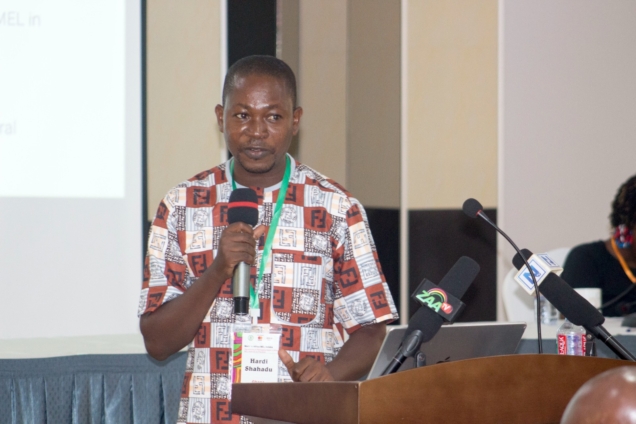Findings from the Decolonizing and Reimagining Made in Africa Monitoring, Evaluation, and Learning (MEL) Methods and Practices project, led by the University for Development Studies (UDS), with support from the Mastercard Foundation, have uncovered the pivotal role of Indigenous Knowledge in Western Science, Disaster Risk Management, and Climate Adaptation.
The research findings also indicate that with the integration of indigenous African knowledge such as traditional medicine and healing, technology, festivities, and recreation, life has improved significantly.
Indigenous agricultural practices, including crop diversification, inter-cropping, and soil conservation methods, provide sustainable solutions to climate change challenges. These techniques, as recognized by scientists, bolster food security, combat soil erosion, and facilitate adaptation to shifting environmental conditions.
Indigenous healers in Africa have long utilized plants like the African potato (Hypoxis hemerocallidea) and bitter aloe (Aloe ferox) to treat various ailments. Western scientists are now investigating these traditional remedies for their pharmacological properties, paving the way for the development of new drugs and medical treatments.
Similarly, in Northern Ghana, residents have devised indigenous water management systems, such as dugout wells and irrigation channels, to navigate seasonal droughts and unpredictable rainfall. Western hydrologists have documented these practices, recognising their value for climate adaptation and sustainable development efforts.
The Project Convenings Lead at UDS, Hardi Shahadu, presented a landscape analysis of Monitoring, Evaluation, and Learning (MEL) Practices, Frameworks & Tools, along with findings from 15 countries across Central, North, and West Africa in Tamale. He emphasises that indigenous African knowledge serves as a crucial foundation to initiate and implement developmental projects within the continent.
He urged participants to reconnect with their cultural heritage and explore the depth of indigenous knowledge that can serve as a foundation for future endeavours.
“We need to go back to our roots to really look at what indigenous knowledge exists that we can build upon,” Hardi said.
Indigenous African knowledge encompasses a complex system of beliefs, customs, traditions, and value systems, along with inter-generational relationships that shape the generation, practice, preservation, and transmission of knowledge to future generations.
Hardi emphasizes areas of opportunity that can be leveraged to ensure the project fulfils its mandate. One such opportunity is utilising people's lived experiences to shape, execute, and assess development initiatives.
He advocates for enhanced collaboration among practitioners, academics, and local communities, urging participants to transition from theoretical discussions to practical implementation in African Monitoring, Evaluation, and Learning (MEL). Additionally, he encourages increased partnership building and forward-thinking approaches.
Judith Akoto from Country Impact Programs Office in Ghana and Sajilu Kamwendo, the director of Outcome & Impact Evaluation, highlight that the Mastercard Foundation backs the Impact team and Foundation in integrating strong inclusive processes, culturally sensitive and de-colonial approaches, and narratives grounded in local contexts.
"We do our evaluations in a respectful and consultative manner. We will ensure that our evaluations are co-created and the results are measured and experienced in multiple ways – focusing on results that matter to young people. Evaluations are focused on the transformative nature of our strategy - change in the lives of young people especially young women, change in systems, institutions and policies at scale," they said.
Latest Stories
-
Leadership must ensure equity for all citizens, regardless of faith – Asiedu Nketiah
3 minutes -
Prof. Alex Manu appointed Executive Director at Centre for Social Justice
6 minutes -
Imminent changes within some key security agencies, state institutions, and its implications
6 minutes -
There are more women than men, but there’s a man for every woman – Rev. Nana Yaa
29 minutes -
Nii Kwei releases ‘The Praise Medley’, a celebration of God’s goodness
34 minutes -
Mistakes in team composition can be costly, pray for us – Fifi Kwetey appeals to Ghanaians
35 minutes -
Mahama forms 5-member Hajj task force to cut pilgrimage costs
58 minutes -
Fuel shortage hits Sissala East and West Districts
1 hour -
President Mahama orders immediate probe into 2020 and 2024 election fatalities
1 hour -
Ken Thompson applauds John Mahama’s initial ministerial appointments
1 hour -
Shatana drops new single “Monicitamol” to inspire women
2 hours -
Mahama calls on party supporters, and others fomenting trouble to act responsibly
2 hours -
We’ll have 2 holidays for Eid al-Fitr celebrations this year – Mahama
2 hours -
Effiduasi market women hit streets in demand for access to stalls after paying contractor
2 hours -
GNAT urges gov’t to prioritise education sector challenges just as it’s tackling energy issues
2 hours

